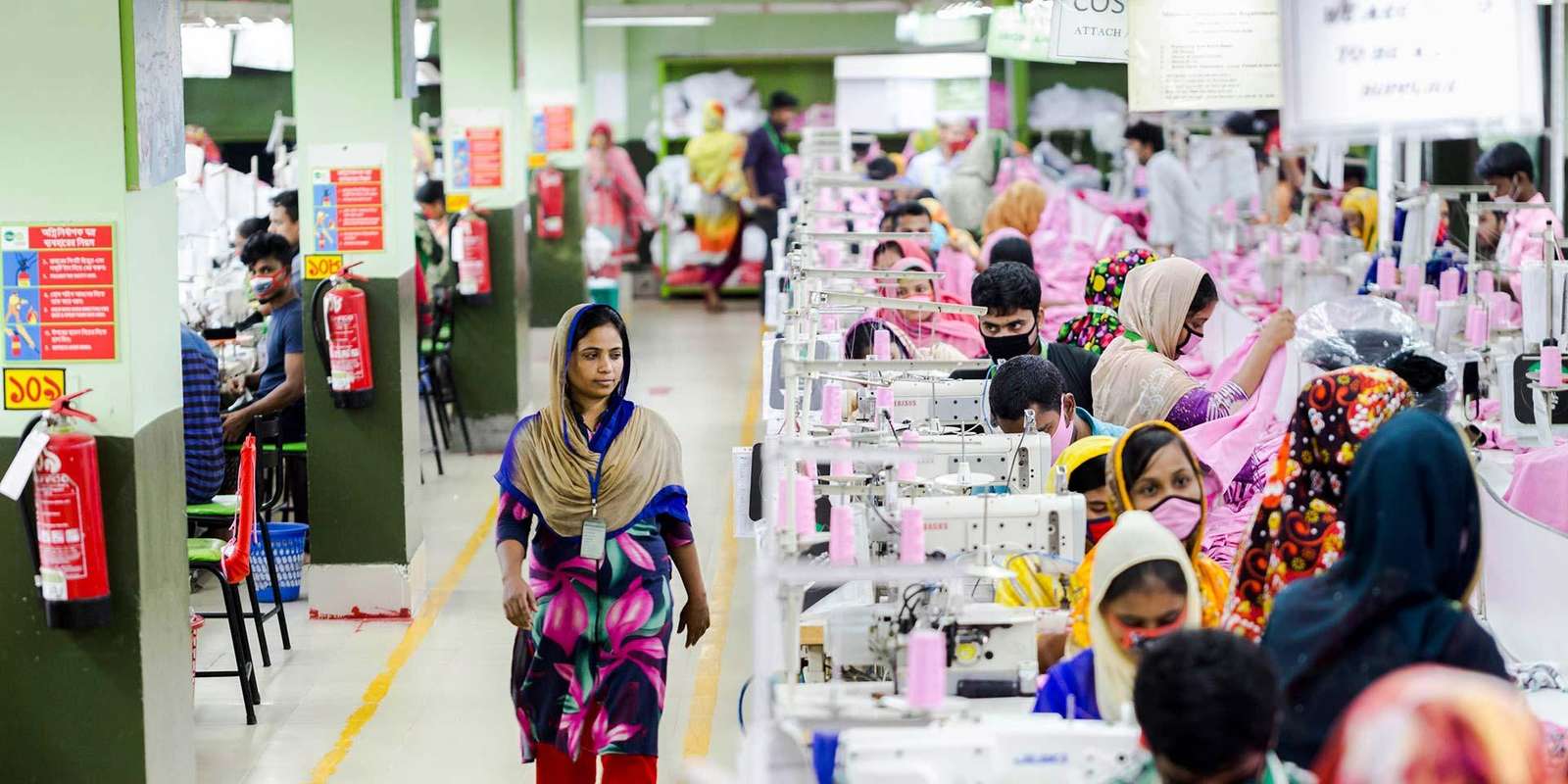As Bangladesh is enjoying a new environment under the present interim government of Professor Mohammed Yunus, the country’s textile and clothing industry can gradually reduce its dependence on neighboring India and explore new sources to increase the competitiveness of the industry, said stakeholders concerned in the textile and clothing industry while talking to the Dazzling Dawn.
As the past government of Sheikh Hasina designed the trade policy to give special privilege to neighboring India, the present interim government can mull over pursuing a conducive and revised trade policy to reduce dependence on India, said a leading entrepreneur in the spinning sector, who was once president of the Bangladesh Textiles Mills Association (BTMA).
As Bangladesh is the second largest export of clothing in the international market after China, Bangladesh is substantially dependent on India in case of cotton and fabrics, sources in the Bangladesh Textiles Mills Association (BTMA) and Bangladesh Garment Manufacturers and Exporters Association (BGMEA).
According to Bangladesh Bank statistics, India exported goods worth 9492 million US dollars as against Bangladesh’s export of 2129 million US dollars showing a trade gap of 7,363 million US dollars.
As India is one of the major exporters of raw cotton to Bangladesh, the country can divert its import source to China, USA, Brazil, Australia and in some cases to Pakistan.
He said Bangladesh in the past suffered a lot depending on its source in India in case of cotton as the neighboring country imposed a ban on export of cotton hampering production in the spinning mills.
India in March, 2012 banned all exports of cotton with immediate effect, amid a decline in production.
Diseases have damaged crops in several states, cutting yields, and exports have been higher-than-expected because of strong demand from China, which takes about 80% of Indian production.
India is the world's second-largest producer and exporter of cotton.
"It's an extremely bad decision," said Dhiren N Sheth, the president of the Cotton Association of India.
"It will harm India's reputation in the international market [and] we will suffer long term," he told the Financial Times.
During that period, the Bangladeshi commerce ministry has said India's ban on cotton export was against global trade norms, and repeatedly stopping the shipments of the natural fibre by the country impacted its textiles industry.
"India imposed a ban on export of main raw material leaving aside trade rules and regulations. We think it [ban] is against the norms of international trade," the then Commerce Secretary M Ghulam Hossain said.
Later, India lifted a ban on cotton exports six days after the restriction was imposed amid protests by Indian farmers and traders due to the falling prices of the item in the domestic market.
The government of India, the world's second-largest producer of cotton, imposed the ban last Monday with immediate effect to increase its stocks for domestic consumers, said the then Indian Commerce Minister Anand Sharma.
The leading entrepreneur in the spinning mill, who was once president of Bangladesh Textiles Mills Association (BTMA) said neighbouring countries in the past sometimes dumped their products on Bangladesh creating a bubble in the industry.
He said that Pakistan produces quality cotton that denim producers in Bangladesh can use and help increase trade with South Asian country
He also sees increased trade potentials with Pakistan as the previous government imposed political, social, economic and cultural restrictions with Islamabad.
Pakistan exported goods worth 698.7 million US dollars to Bangladesh, while Bangladesh’s export to Pakistan recorded at only 83.97 million US dollars. Pakistan exported goods worth 801.7 million Us dollars , while Bangladesh’s export to Pakistan stood at only 105.79 million US dollars.
Through trade liberalization, both Dhaka and Islamabad can increase economic, social and cultural connections.
After 14 long years, Pakistani music band Jal took Dhaka's stage by storm.
Both Dhaka and Islamad restricted visa processes in the last 15 years that resulted in less social and cultural connections, sources said.
Bangladesh-Pakistan relations that suffered heavily during the last 15 years are likely to improve in the coming days as the new interim government, headed by Nobel laureate Professor Dr. Muhammad Yunus, has pledged to maintain friendly relations with every country in the world.
The head of the interim government Nobel laureate Professor Dr. Muhammad Yunus said different countries and the United Nations have already extended their full support for the present interim government.
"We will maintain friendly relations with all countries. Mutual trust, belief and cooperation will be the base of our foreign policy. We are respectful to all international laws, including human rights. We have taken steps to become signatory to the international convention on enforced disappearances," said Nobel laureate Professor Dr. Muhammad Yunus.
Bangladesh imported Indian cotton valued at 4335.8 million US dollars (31.1 per cent of total import) in 2021-22 fiscal year that dropped to 1921.9 million US dollars (20.2 per cent).
Textiles and textile articles constitute the highest portion of Bangladesh’s total export as Bangladesh is highly dependent on imported cotton and in some cases on fabrics used in the readymade garment industry.
The total import of Bangladesh stood at 68,459.9 million US dollars and out of that import, import of textiles and textile articles stood at 14,916.3 million, showing 21.8 per cent of total import in 2022-23 fiscal year. Bangladesh’s total import stood at 78,784 million US dollars, out of that imports of textiles and textiles articles stood at 178,98.1 million, showing 22.7 per cent.
As the previous government of Sheikh Hasina was dependent on neighboring country to retain power, her government pursued the trade policy to give special privileges to India, said a top entrepreneur in the spinning mill ..
Meanwhile, BNP Secretary General Mirza Fakhrul Islam Alamgir alleged that India is attempting to "destroy" Bangladesh's ready-made garment (RMG) industry in a move to capture the country's export markets.
"The urgent need is to form a task force to protect domestic industries from both local and foreign conspiracies," the BNP leader said at a labour rally organised by Gazipur District and Metropolitan Shramik Dal at Konabari Degree College field in the district.
The rally, held to demand the peaceful resolution of unrest in RMG factories and other industries, called for the regular payment of wages and benefits to workers and employees.
Fakhrul also alleged that ousted prime minister Sheikh Hasina and her associates have now resorted to creating instability in the industrial sector, including RMG and pharmaceuticals, to weaken the economy in collaboration with foreign forces.
"Sheikh Hasina may have fled the country, but her accomplices are still here, attempting to create unrest and destabilise the country. We have urged the interim government to send a letter to India requesting Hasina's extradition to ensure that she faces trial," he said.
Meanwhile, the central bank data shows Bangladesh’s import of RMG raw materials such as raw cotton, yarn, fabric and dyeing materials was US $ 7.92 billion in the first half of FY ’24. The BGMEA reports Bangladesh’s apparel exports are 71 per cent cotton-based.
The country, however, meets 99 per cent of its cotton demand through imports. After Brazil, India is the second largest cotton supplier to Bangladesh and holds a 12 per cent market share, according to United States Department of Agriculture (USDA).
In terms of MMF-based raw materials, 98 per cent of the country’s MMF demand is import-dependent. Central bank data shows that the country’s synthetic yarn import valued at US $ 1.52 billion in the July-December period of FY ’24.
Over a decade, Indian textile companies have made a substantial impact on Bangladesh’s textile industry by extending and maintaining their stronghold. With the growing demand for quality textiles and cost-effective production, Indian companies have emerged as key players in the country.
Indian textile companies possessing nearly a quarter of shares
Bangladesh’s and India’s textile industries have long entwined themselves. Given that both countries are adjacent to each other and have a common cultural background and history, it is not surprising that the textile industry has been vital for the growth of their economies.
Lahoti Overseas Limited, a prominent textile company in India with a US $ 60 million turnover, produces 2000 tonnes of carts of yarn, fabrics and raw cotton annually, of which 20 per cent is imported into Bangladesh.
Square Corporation, one of the biggest global suppliers of yarn, has been exporting more than 220 containers to around 20 countries for over three decades and has its own office in Dhaka.
Subhajit Koley, the company’s Country Manager demonstrated, “Out of all the export areas in India, around 70 per cent of them involve exports to Bangladesh. The demand for cotton is highest there because local exporters can hardly procure it, so we have to import from all the major companies.”
Indian textile companies continue to succeed in Bangladesh Subhajit Koley, Country Manager, Square Corporation.
Another textile company in India, Indorama, holds a great share in Bangladesh. Indorama Group’s Spandex business, INVIYA®, established in India in 2012, is the country’s first premium spandex manufacturer, having started with a 400-tonne monthly production capacity. Over the last decade, the company has grown fivefold to a 2000-tonne monthly capacity. According to Sandeep Tayal, Head of Export Sales, “Bangladesh is an important market for us.”
Indian textile companies continue to succeed in Bangladesh Sandeep Tayal, Head of Export Sales, Indorama.
Rahul Singh, Head of Business Development at Indorama said, “As of right now, we are working with many reputed mills in Bangladesh and supplying regular spandex, recycled spandex and black spandex on a regular basis. Bangladesh, being a large garment exporting country, is an important market for us.”
Bangladesh is now amongst India’s top five export destinations.
According to the UN Comtrade Database on international commerce, India’s exports to Bangladesh in 2023 amounted to US $ 11.25 billion, with textile and RMG raw materials contributing significantly.
India’s export of cotton to Bangladesh values US $ 2.18 billion, with man-made staple fibres coming in at US $ 139 million, knitted fabric coming in at US $ 58.06 million, laminated textile fabric at US $ 14.06 million and vegetable textile fibres at US $ 11.78 million. In terms of pricing, garment production, finishing and business set-up, Indian companies perceive a larger potential in Bangladesh.
Envision is one of the most well-known Indian textile enterprises that exported around 400 containers to Bangladesh last year where they have many large factories whose clients work with bigger brands like Zara, H&M, M&S and C&A.
Girish Chander, the company’s Coordinator of Business Development, stated, “Bangladesh has enormous potential. Everyone now seeks to choose sustainable and effective solutions which other countries cannot provide as they do not have the right kind of infrastructure for clothing business, either as producers or consumers, which is available in Bangladesh.”
In terms of foreseeing possibilities in Bangladesh, Sandeep Tayal said, “Major brands will always be drawn to Bangladesh to manufacture their apparel because of the ecosystem that exists in Bangladesh market. I have witnessed Bangladesh’s growth over the past 20 years to a degree that I could not have predicted earlier. Bangladesh, therefore, has everything it needs to prosper today.”




.jpg)



.svg)
